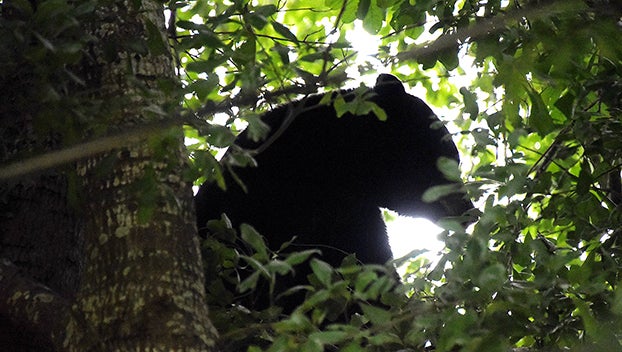Louisiana black bear season re-established
Published 10:36 am Thursday, June 20, 2024

- A black bear took a morning break in the backyard tree of a house in northeast Natchez near St. Catherine Creek in 2020. (Ben Hillyer / The Natchez Democrat)
|
Getting your Trinity Audio player ready...
|
BATON ROUGE — Louisiana’s traditional black bear hunting season was signed and re-established by Gov. Jeff Landry Tuesday. Black bears were protected for decades in Louisiana until populations were deemed large enough to sustain a hunting season.
Louisiana House Bill 684, which re-established the black bear season, would expand the use of funds in the Louisiana black bear account of the Conservation fund. Management, conservation, restoration and enhancement of black bear species in addition to its habitat will be included.
The bill creates a $25 black bear hunting license which would be required in addition to a bear harvest permit and basic hunting license to hunt black bears in a draw hunt.
The Louisiana Wildlife and Fisheries Commission is authorized to conduct a draw hunt for black bears with an application fee of $50. Additionally, the Secretary of the Department of Wildlife and Fisheries is able to auction off one bear harvest permit to the highest bidder.
Under the bill, baiting of bears is only allowed for properly licensed and permitted hunters. LDWF secretary Madison D. Sheahan issued a statement on the momentous occasion.
“I would like to thank Governor Jeff Landry and the members of Louisiana’s legislature, especially Representative Neil Riser, for supporting black bear management in Louisiana,” Sheahan said. “Louisiana has a long list of conservation success stories that are supported by our hunters and landowners. This will be another example of one of those success stories.”
Louisiana’s bear season will open the first Saturday in December and will close the Sunday following the third Saturday in December. It will be only open for Bear Area No. 4 which includes Tensas, Madison, East Carroll, West Carroll and parts of Franklin and Richland Parishes. LDWF reports 10 tags will be drawn for the 2024 Bear season. The number of tags each year will be based on population specific data and vital rate data collected at regular intervals.
LDWF states in its rules for the bear season that “The number of bear harvest permits issued at any given time during the season shall not allow the harvest to exceed the number of bears of either sex in any Bear Area that would compromise the long-term sustainability of the Bear Area population.”
The harvest limit for a drawn and permitted hunter is one bear per season and hunting must be still hunt only. Any harvest of cubs or females with cubs is prohibited. Cubs are defined as any bear weighing 75 pounds or less.
LDWF Large Carnivore Program Manager John Hanks said from the start of the process they would do what is best for the bear population and have a conservative hunting season.
“The success of the black bear recovery effort is a historic event that we can all be proud of. This was made possible by the hard work and determination of our landowners, outdoor enthusiasts, our government and non-government partners, and both past and present LDWF employees,” Hanks said. “Thank you so much to everyone who was part of this effort, you have done something that will shape the Louisiana outdoor culture for generations to come.”
Mississippi Department of Wildlife, Fisheries and Parks Black Bear Program Coordinator Anthony Ballard is leading the work in Mississippi to figure out a solid population estimate and status of black bears. The work is part of a bigger picture plan to restore the black bear hunting season in Mississippi following similar patterns with white-tailed deer, turkey and alligator restoration.






